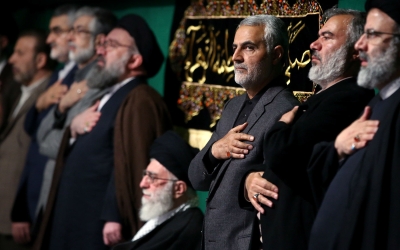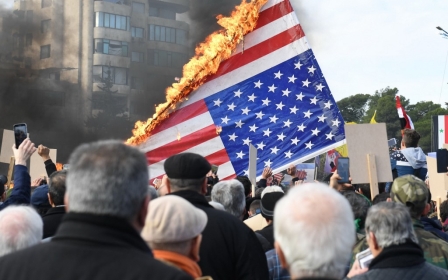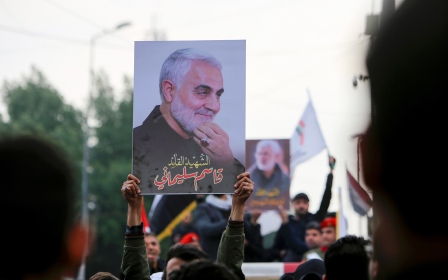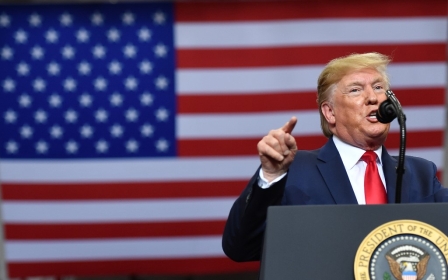Ali Khamenei's adviser says Iran's response to US will be 'against military sites'
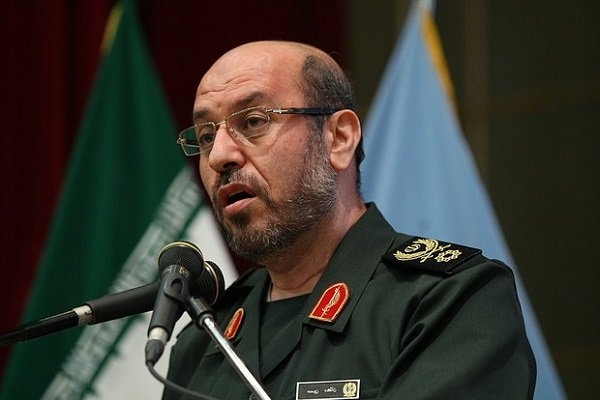
The military adviser to Iran's supreme leader said that his country's response to the killing of its top general, Qassem Soleimani, by the United States will be a military one that will target "military sites".
However, former Defence Minister Hossein Dehghan told CNN that his country was not seeking war with the US after the killing of Soleimani, the Iranian-backed Iraqi militia leader Abu Mahdi al-Muhandis, and several others at Baghdad airport on Friday.
New MEE newsletter: Jerusalem Dispatch
Sign up to get the latest insights and analysis on Israel-Palestine, alongside Turkey Unpacked and other MEE newsletters
Speaking on Sunday, Dehghan, who advises Supreme Leader Ali Khamenei, said: "Let me tell you one thing: our leadership has officially announced that we have never been seeking war and we will not be seeking war.
"It was America that has started the war. Therefore, they should accept appropriate reactions to their actions.
"The only thing that can end this period of war is for the Americans to receive a blow that is equal to the blow they have inflicted. Afterward, they should not seek a new cycle."
Deghan's remarks were echoed by Hezbollah leader Hasan Nasrallah and Iraqi populist cleric Muqtada al-Sadr who said the response to Soleimani's death would be a military one and that US troops should leave the region.
A former chief of Iran’s elite Revolutionary Guards said that the Israeli city of Haifa and Israeli military centres would be included in Tehran's retaliation, according to Reuters.
"Iran's revenge against America for the assassination of Soleimani will be severe... Haifa and Israeli military centres will be included in the retaliation," Mohsen Rezaei said in a televised speech to a gathering of mourners in Tehran.
Nasrallah on Sunday said that the US military would pay the price for killing Soleimani and warned that US soldiers would return home in coffins.
"Fair punishment is [aimed at] the American military presence in the region, American military bases, American naval ships, every American officer and soldier in our countries and region," Nasrallah said.
Iraq's parliament passed on Sunday a resolution telling the government to end the presence of foreign troops in Iraq and ensure they do not use its land, air, and waters for any reason.
The US has roughly 5,200 troops in the country.
In a statement on Sunday, Sadr said a security agreement with the US should be cancelled immediately, the US embassy should be closed down, American troops should be expelled in a humiliating manner, and communication with Washington should be criminalised.
'Ridiculous and absurd'
Deghan's comments came after US President Donald Trump said the US would target 52 sites, including cultural ones, across Iran in response to any attack on US assets.
Dehghan said Trump's tweets were "ridiculous and absurd".
"[Trump] doesn't know international law. He doesn't recognise UN resolutions either. Basically he is a veritable gangster and a gambler. He is no politician; he has no mental stability," Dehghan said.
Dehghan said that "if [Trump] wants to impose rule, logic and rationality over his decision, he should accept that he is a war criminal and must be tried in a relevant court".
United Nations resolution 2347 condemns the unlawful destruction of cultural heritage.
"For sure, no American military staff, no American political centre, no American military base, no American vessel will be safe. And they are accessible to us," said Dehghan, when asked what Iran's response would be if any of its cultural sites were hit.
Who was Qassem Soleimani?
+ Show - HideIranian Major-General Qassem Soleimani, the shadowy top commander of the Quds Force of the Revolutionary Guards, helped Iran fight proxy wars and increase its foothold across the Middle East.
His assassination in a US air strike on his convoy at Baghdad airport on 3 January marked the end of a man who was celebrated at home and closely watched by the US, Israel and Tehran's regional rival Saudi Arabia.
From working as a teenager to pay off his father’s debts to a swift rise in Tehran’s elite force, Soleimani, 62, was responsible in the end for Iran’s clandestine overseas operations and was often seen on battlefields guiding Iraqi Shia groups in the war against Islamic State.
He was born into an agricultural family in the village of Qanat-e Malek in southeast Iran in 1957. At 13, he moved to the town of Kerman to work in construction and help his father pay back loans, according to a first-person account from Soleimani posted by Defa Press, a site focused on the history of Iran’s eight-year war with Iraq.
When the revolution to oust the shah began in 1978, Soleimani was working for Kerman's municipal water department and organised demonstrations against the monarch. He volunteered for the Revolutionary Guard and, after war with Iraq broke out in 1980, quickly rose through the ranks and went on to battle drug smugglers on the border with Afghanistan.
In 1998, he became chief of the Quds Force, a post in which he helped Iran form regional alliances as it came under pressure from the US sanctions that have devastated its economy. He kept a low profile in this position while he strengthened Iran’s ties with Hezbollah in Lebanon, Syrian President Bashar al-Assad's government and militia groups in Iraq.
At the height of the civil war between Sunni and Shia militants in Iraq in 2007, the US military accused the Quds Force of supplying improvised explosive devices to Shia militants which led to the death of many American soldiers.
As the Americans struggled to stabilise the country and were looking for a broker to help, Soleimani wrote to US General David Petraeus, then commanding US forces in Iraq, in 2008.
"General Petraeus, you should know that I, Qassem Suleimani, control the policy for Iran with respect to Iraq, Lebanon, Gaza and Afghanistan," the commander reportedly wrote in a phone text.
"The ambassador in Baghdad is a Quds Force member. The individual who's going to replace him is a Quds Force member."
Soleimani was arguably even more influential in Syria. Under him, the Quds Force shored up support for Assad when he looked close to defeat in the civil war that has been raging since 2011. His visit to Moscow in the summer of 2015 was the first step in planning for a Russian military intervention that reshaped the Syrian war and forged a new Iranian-Russian alliance in support of Assad.
His activities had made him a repeated target of the US Treasury: Soleimani was sanctioned by the United States for the Quds Force's support for Lebanon's Hezbollah and other armed groups, for his role in Syria’s crackdown against protesters and his alleged involvement in a 2011 plot to assassinate Adel al-Jubeir, then the Saudi ambassador to the United States.
Soleimani’s success in advancing Iran’s agenda had put him in the crosshairs of regional foes Saudi Arabia and Israel even before the US assassination on Friday. In 2017, top Saudi intelligence officials looked into the possibility of using private companies to kill Soleimani, according to the New York Times.
He was killed along with top Iraqi militia commander Abu Mahdi al-Muhandis. Both men were seen as heroes in Iran's fight against its enemies and state television heaped them with praise after their deaths were announced. A Revolutionary Guard spokesman cried during a live broadcast.
Trump's threats came after Iranian officials vowed to avenge the assassination of Soleimani.
Following Trump's statement, documented in a series of tweets, Iranian officials condemned the US president and described him as a "terrorist in a suit".
Echoing Dehghan's comments, Iran's Foreign Minister Javad Zarif said that targeting cultural sites would be tantamount to "war crimes".
Tehran also summoned the Swiss ambassador in response to Trump's tweets and described his comments as similar to Mongol threats to ransack cultural sites. The Swiss embassy represents US interests in Tehran.
Iran will decide on Sunday about its next step to further roll back its commitments to a nuclear deal that the US withdrew from in May 2018, foreign ministry spokesman Abbas Mousavi was quoted as saying.
Middle East Eye delivers independent and unrivalled coverage and analysis of the Middle East, North Africa and beyond. To learn more about republishing this content and the associated fees, please fill out this form. More about MEE can be found here.


